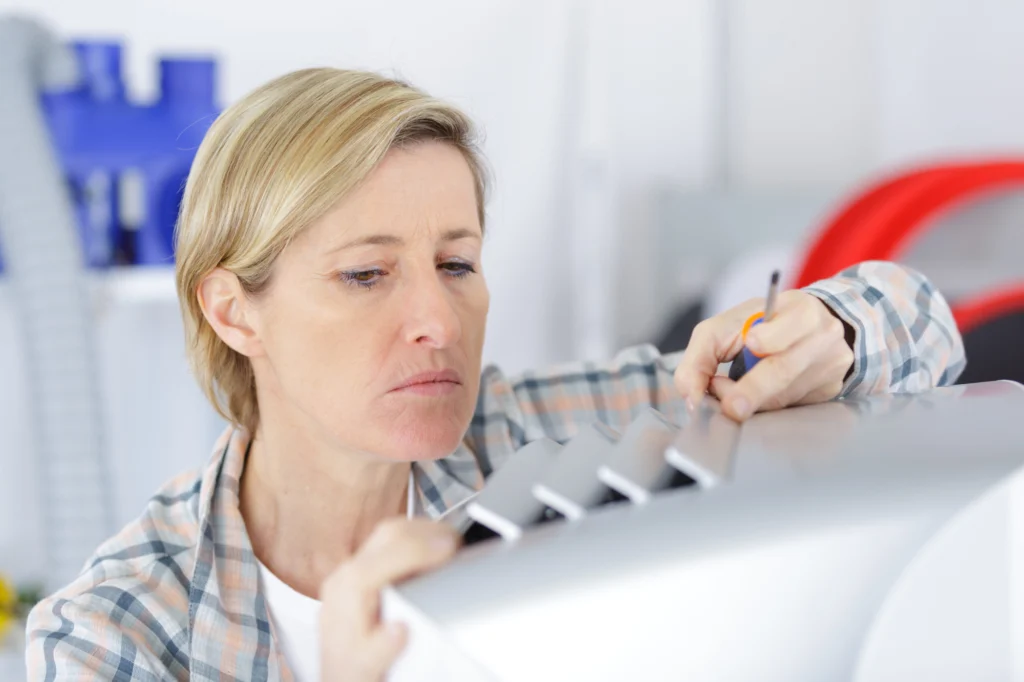When people think of air pollution, they tend to think about the smog that settles in the air in big cities, or a hazy ozone layer in the summer heat. However, the inside of a home or building can house many pollutants as well. Sometimes the air indoors is even worse than outside.
Indoor air quality can be affected by a number of things including dust, chemical fumes, lead, radon, fire retardants, and conventional cleaners. Other pollutants are brought from the outside in.
So, how can you improve indoor air quality? What can be done on a regular basis to ensure that the air inside is fresh and clean?
There are some things that can be easily managed by the homeowner and some efforts that require professional assistance.
Let’s take a look at 8 ways to improve the air quality inside:
- Change Your AC Filter Regularly: Your HVAC system is likely working around the clock, especially during the hot summer months and during a time when people are home more often than ever.
Maintaining the perfect temperature indoors takes lots of air cycling through your filters.
Before long, the air filters will fill up with pollutants and dust and not work as efficiently as they should.
Air filters that aren’t performing properly spell trouble for indoor air quality. Filters that are blocked up can lead to expensive repairs if they aren’t changed in a timely manner.
One of the simplest yet most effective things anyone can do to keep their air quality clean is to change out their air filters regularly. - Check Other Filters In The Home As Well: The AC filter isn’t the only one that people should check in an effort to maintain clean air indoors. Taking that extra step to ensure clean air means checking other filters within the home.
These might include vacuum cleaner filters, the filter inside the clothes dryer, kitchen vents, etc.
Some of these filters should be checked every week while others require monthly cleaning. - Air Ducts Should Be Checked And Cleaned Professionally: The air ducts are responsible for distributing cold and hot air throughout the entire home making it possible to maintain a comfortable temperature throughout.
Air ducts that are either installed improperly or not regularly maintained can distribute all kinds of contaminants throughout the home.
Without being checked and cleaned by a professional, dander, dust, and even mold can start to accumulate in the air ducts. This greatly reduces overall air quality.
A professional can make sure the air ducts are cleaned out and that there are no leaks. Having clean air ducts will drastically improve air quality. - Make Use of Cooking Vents: There are a surprising number of air pollutants that originate in the kitchen. Gas stoves release harmful contaminants including nitrogen dioxide and carbon monoxide.
And electric burners aren’t harmless. They release some of the same pollutants, albeit in smaller doses.
When cooking, homeowners should make sure to turn on their kitchen vents or open a window to allow the circulation of fresh air. - Rugs and Carpets Should Be Vacuumed and Shampooed Regularly: Carpets and rugs are big culprits when it comes to collecting dust and debris particles which become embedded deep in the carpet fibers.
Because of this, carpets and rugs should be vacuumed on a weekly basis bare minimum, and daily if young kids or pets are present in the home.
Homeowners should consider having their rugs and carpets professionally shampooed. A professional deep cleaning can get rid of dust particles and dirt that a regular vacuum can’t easily access. - Control the Humidity in the Home: Moisture and humidity in the home make for the perfect breeding grounds for mildew and mold. When mold and mildew are present, occupants might start to experience serious respiratory problems including asthma and allergies.
Those who live in humid locations should be especially careful about monitoring the humidity levels in their home. This can be done with the help of reliable humidifiers.
Other ways of controlling the humidity levels include fixing leaky plumbing to prevent mold, using an exhaust fan when cooking or running the dishwasher, not overwatering houseplants, and venting the clothes dryer to the outside.
If there’s a suspicion of mold growth, a professional HVAC technician can help. - Freshen Indoor Air Quality With Indoor Plants: How can you improve indoor air quality?
Plants make great air filters, both outdoors and in. Not only do plants enhance the decor, their pull contaminants out of the air and keep things smelling fresh and clean.
Plants can be added in any room where there’s adequate sunlight to help everyone breathe easier while inside. - Avoid Overusing Chemical Cleaning Agents: Many people associate the strong smell of bleach, pine or lemon-scented cleaner, and synthetic laundry detergent fragrances with cleanliness. Many of these cleaning products contain lots of different chemicals that can contaminate the overall quality of the air indoors.
When possible, use natural cleaning agents such as baking soda or vinegar and limit the use of aerosol sprays. Fragrance-enhanced air fresheners are also a big culprit.
For a fresh-smelling home, opt instead for open windows and indoor plants.
How Can You Improve Indoor Air Quality? We Can Help
So, now you know the answer to the question, “How can you improve indoor air quality as a homeowner?”
While we’ve discussed some of the most common ways to improve your air quality yourself, one of the best things you can do is get help from a professional.
We’re here to take the hassle out of improving the air in your home. We can help you maintain your air filters or change them out for you as needed, and get the job done quickly and efficiently.
Contact us today to learn more about our services and to schedule an appointment!




